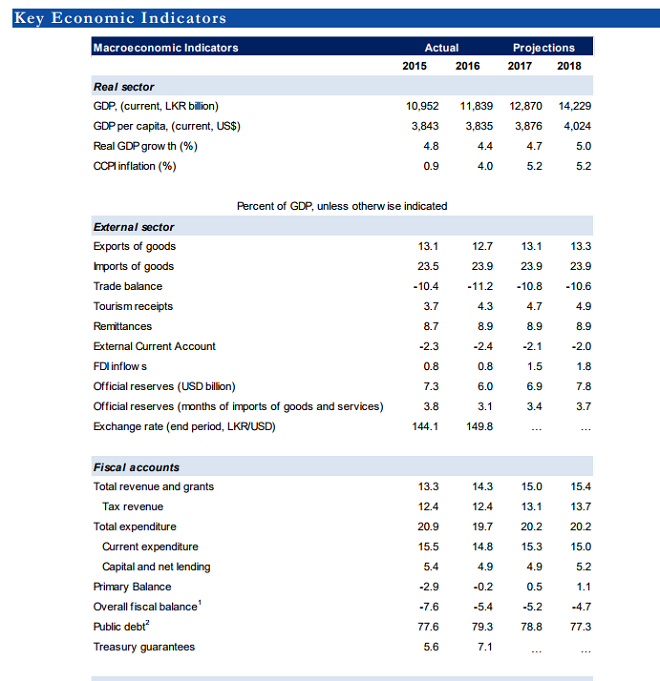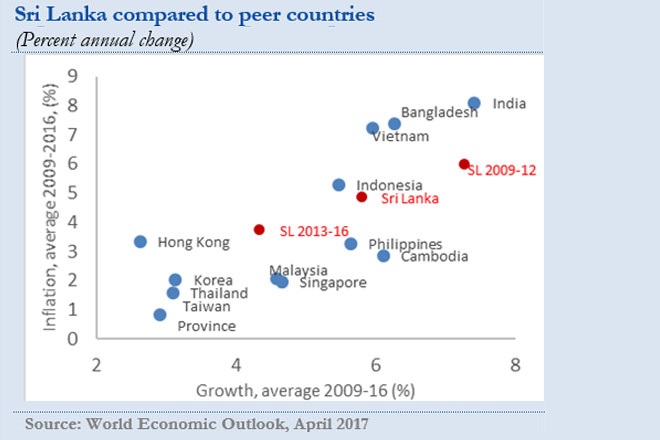 Narrowing fiscal deficit
In addition to building resilience to meet natural disasters, among the report’s recommendations, are the need to raise more revenue while controlling current expenditures to bring public debt to a sustainable path.
Implementing the new Inland Revenue Act, soon to be submitted to the Parliament, will make for a good starting point, it said.
The fiscal deficit is expected to narrow to 5.2 percent of GDP this year, from 5.4 percent of GDP last year.
Among the risks identified by the report are delays in implementing structural revenue measures, slower than expected improvement in tax administration, less favorable growth in the global economy and faster than expected global commodity price rises.
In addition, faster implementation of several vital reforms, identified by the government, such as those affecting state-owned enterprises like Sri Lankan Airlines and measures to strengthen accountability and transparency are crucial.
Additional urgent reforms such as improving the ease of doing business in Sri Lanka and trade facilitation are designed to address the issue of the economy’s weak competitiveness.
The country also attracts a much lower volume of Foreign Direct Investment than peer economies.
“Sri Lanka has an opportunity to move to new sources of growth and jobs by opening up to trade and diversifying its economy,” said Ralph Van Doorn, Senior Country Economist and one of the authors of the Sri Lanka Development Update.
He emphasized that moving ahead with measures to increase exports and fiscal revenue should give Sri Lanka the means to improve the lives of the poor and help the economy adjust.
The government is committed to implement an ambitious medium-term reform agenda aimed at improving competitiveness, governance and public financial management that would bring in long-term benefits.
Continuation of reforms along with the IMF program will add to the confidence while helping reform the tax system to pursue revenue led fiscal consolidation, the report adds.
Narrowing fiscal deficit
In addition to building resilience to meet natural disasters, among the report’s recommendations, are the need to raise more revenue while controlling current expenditures to bring public debt to a sustainable path.
Implementing the new Inland Revenue Act, soon to be submitted to the Parliament, will make for a good starting point, it said.
The fiscal deficit is expected to narrow to 5.2 percent of GDP this year, from 5.4 percent of GDP last year.
Among the risks identified by the report are delays in implementing structural revenue measures, slower than expected improvement in tax administration, less favorable growth in the global economy and faster than expected global commodity price rises.
In addition, faster implementation of several vital reforms, identified by the government, such as those affecting state-owned enterprises like Sri Lankan Airlines and measures to strengthen accountability and transparency are crucial.
Additional urgent reforms such as improving the ease of doing business in Sri Lanka and trade facilitation are designed to address the issue of the economy’s weak competitiveness.
The country also attracts a much lower volume of Foreign Direct Investment than peer economies.
“Sri Lanka has an opportunity to move to new sources of growth and jobs by opening up to trade and diversifying its economy,” said Ralph Van Doorn, Senior Country Economist and one of the authors of the Sri Lanka Development Update.
He emphasized that moving ahead with measures to increase exports and fiscal revenue should give Sri Lanka the means to improve the lives of the poor and help the economy adjust.
The government is committed to implement an ambitious medium-term reform agenda aimed at improving competitiveness, governance and public financial management that would bring in long-term benefits.
Continuation of reforms along with the IMF program will add to the confidence while helping reform the tax system to pursue revenue led fiscal consolidation, the report adds.buy neurontin online buy neurontin online no prescription
"Monetary policy has shown that it stands ready to take appropriate action in the direction of stability. These developments have contributed to an improved outlook." Targeted social safety The report said that in order to consolidate the gains in poverty reduction, a careful consideration of distributional impact of tax and spending on poverty will make it possible to increase tax collection, while offsetting the negative impact on the poor. "For example, it appears that little of the direct benefits of many current VAT exemptions accrue to the poor." "In fact, virtually all tax exemptions are less efficient in helping poor, since wealthier households account for the majority of consumption on almost all specific items. However, removing them does come at the cost to the poor." Replacing them by targeted expenditure under the social safety net could be a more efficient way to protect the poor at a lower fiscal cost, while simplifying the VAT system, the report added.

